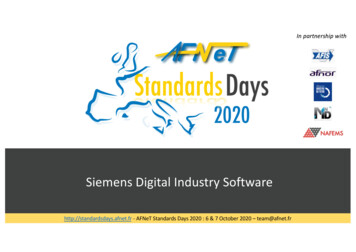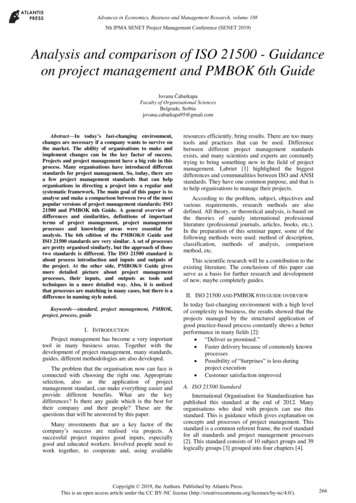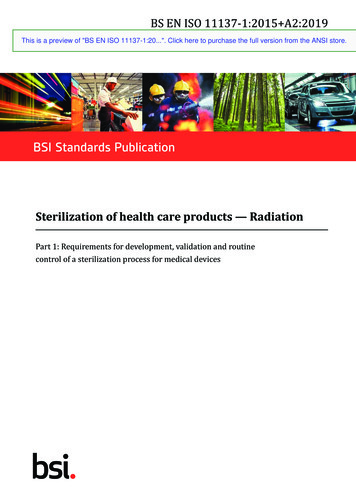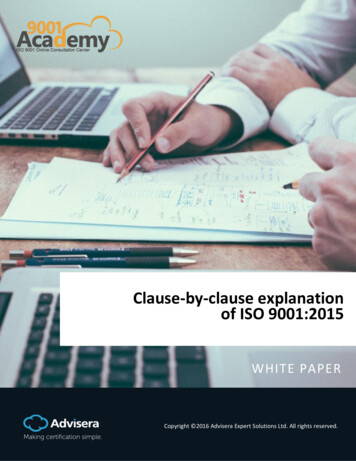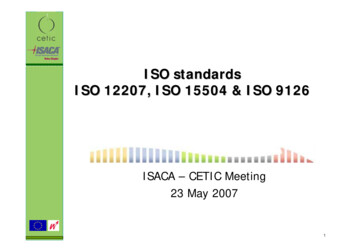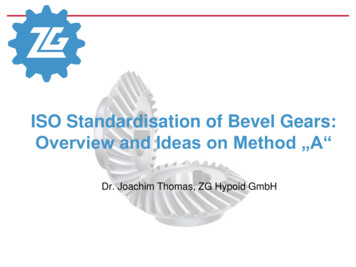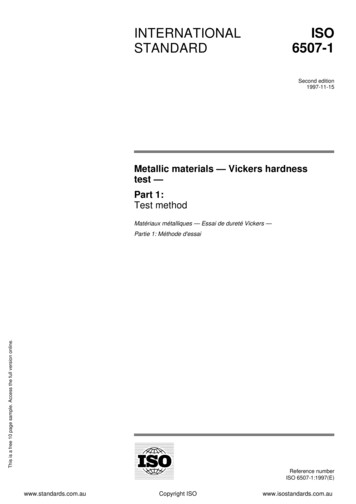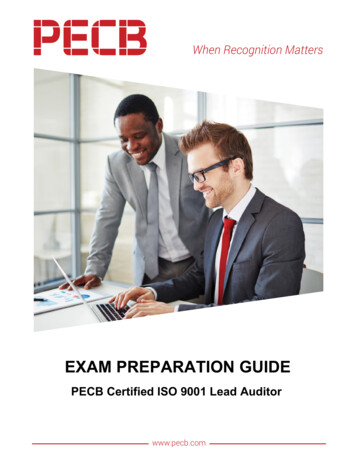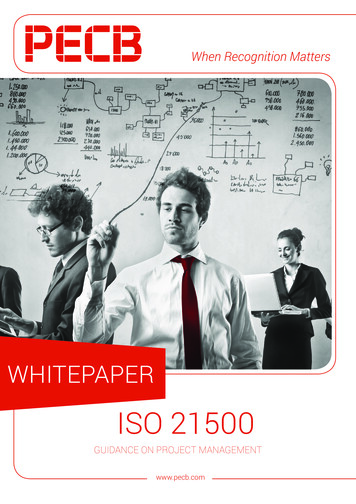
Transcription
When Recognition MattersWHITEPAPERISO 21500GUIDANCE ON PROJECT MANAGEMENTwww.pecb.com
CONTENT3Introduction4An Overview of ISO 21500:20124Key Clauses of ISO 21500:20127Link between ISO 21500 and other project management standards and methodologies8Link with ISO 100068Project Management – The Business BenefitsImplementation of IMS2 Methodology9Training and Certification of Professionals10Choosing the Right CertificationsPRINCIPAL AUTHORSEric LACHAPELLE, PECBBesnik HUNDOZI, PECBBardha AJVAZI, PECB2ISO 21500 // GUIDANCE ON PROJECT MANAGEMENT
INTRODUCTIONProject management provides a framework to help accomplish business goals. Even though it is oftenunderestimated, project management can be seen as a driving force behind any task.It is considered as a discipline with the purpose to achieve specific goals and objectives by planning,organizing, motivating and controlling resources. Project management is recognized as an efficient tool tohandle complex activities.According to some recent surveys, the demand of employees in major economies to participate in projects will be 32.6 million. One fifth of the world’s GDP is spent on projects. A proportion of 90% of seniorexecutives think that project management is critical for the delivery of successful projects and for remaining competitive in the job market. opSc Qualit ystIt is designed to align with related International Standards,such as:CoIt is the first standard in a planned family of project management standards.eISO 21500 is an international standard issued in 2012 by ISO(International Organization for Standardization) and is intendedto serve as guidance on the concepts and processes of projectmanagement.Tim eISO 10006:2003, Quality Management SystemsGuidelines for quality management in projects,ISO 10007:2003, Quality Management SystemsGuidelines for configuration management,ISO 31000:2009, Risk Management – Principles andguidelines,and some sector-specific standards in industries such as aerospace and IT.ISO 21500 is designed to be applied globally, across a wide range of industries and types of projects.ISO 21500 // GUIDANCE ON PROJECT MANAGEMENT3
An overview of ISO 21500:2012ISO 21500 provides guidance and high-level descriptions of concepts and processes that are consideredimportant in project management and that are important for, andhave impact on, the performance of projects.The guidance provided by this International Standard can be usedby any type of organization, including public, private or communityorganizations, and for any type of project, irrespective complexity,size or duration.Even though the projects are placed in the context of programmes andproject portfolios, this International Standard does not provide detailedguidance on the management of programmes and project portfolios.What is a Project?A project consists of a uniqueset of processes consistingof coordinated and controlledactivities, with start and enddates, performed to achieveproject activities.It provides a better understanding of the principles and practice of project management.The target readership of ISO 21500 is the following: Senior managers and project sponsorsProject managers, project management teams andproject team membersDevelopers of national or organizational standardsKey Clauses of ISO 21500:2013ISO 21500 is organized into the following main clauses:Clause 3: Project Management ConceptsClause 4: Project Management ProcessesWhat is Project Management?Project management is the application of methods, tools, techniques andcompetencies to a project. It includesthe integration of the various phases ofthe project life cycle, which spans theperiod from the start of the project toits end.Clause 3: Project Management ConceptsThis clause describes key concepts applicable to most projects and environments in which they areperformed.The key concepts in project management according to ISO 21500 are: 4ProjectProject managementOrganizational strategy and projectsProject environmentProject governanceProjects and operationsStakeholders and project organizationCompetencies of project personnelProject life cycleProject constraintsRelationship between project management concepts and processesISO 21500 // GUIDANCE ON PROJECT MANAGEMENT
External EnvironmentOrganisation EnvironmentOrganizational StrategyOpportunitiesBenefitsProject EnvironmentProject GovernanceBusiness CaseProject OrganizationProjectOperationsProject Management ProcessesDeliverablesProduct ProcessesSupport ProcessesClause 4: Project Management ProcessesThis clause identifies the recommended project management processes to be used during a project as awhole, for individual phases or both.The project management processes can be viewed from two different perspectives, as:1. Process groups for the management of the project; Each process group consists of processes that are applicable to any project phase or project. Theseprocesses, defined in terms of purpose, description and primary inputs and outputs, are interdependent.The process groups are independent of application area or industry focus2. Subject groups for collecting the processes by subject Each subject group consists of processes applicable to any project phase or project. These processesare defined in terms of purpose, description and primary inputs and outputs, and are interdependent.Subject groups are independent of application area or industry focus.ISO 21500 // GUIDANCE ON PROJECT MANAGEMENT5
SubjectgroupsProcess groupsInitiating4.3.2 Developproject charterPlanning4.3.3 Developproject plansImplementing4.3.4 Directproject workIntegrationStakeholders4.3.9 Identifystakeholders4.3.10 Managestakeholders4.3.11Define scope4.3.12 Creatework breakdown structure4.3.13 Defineactivities4.3.15Establishproject team4.3.16Estimateresources4.3.17 Defineprojectorganization4.3.14 Controlscope4.3.18 Developproject team4.3.19 Controlresources4.3.20 Manageproject team4.3.24 ControlscheduleTime4.3.21Sequenceactivities4.3.22 Estimateactivitydurations4.3.23 DevelopscheduleCost4.3.25Estimate costs4.3.26 Developbudget4.3.27 ControlcostsRisk4.3.28Identify risks4.3.29Assess risks4.3.30 Treatrisks4.3.31 Controlrisks4.3.32 Planquality4.3.33 Performquality assurance4.3.34 Performquality controlProcurement4.3.35 Planprocurements4.3.36 Selectsuppliers4.3.37 Administer procurementsCommunication4.3.38 Plancommunications4.4.39 Distribute information4.3.40 ManagecommunicationsQuality64.3.5 Controlproject work4.3.6 controlchangesScopeResourceControllingISO 21500 // GUIDANCE ON PROJECT MANAGEMENTClosing4.3.7 Closeproject phaseor project4.3.8Collect lessonslearned
Link between ISO 21500 and other project managementstandards and methodologies Link with PRINCE2 PRINCE2 (PRojects IN Controlled Environments) is a widely used project management method developedby the UK government. It provides a process-based approach for the management of all types of projects. Link with PMBOKPMBOK (Project Management Body of Knowledge) presents a set of standard terminology and guidelinesin project management. The latest version of this guide, the fifth edition, was published in 2013 by PMI(Project Management Institute).Similarities between ISO 21500 and PMBOKBoth standards (ISO 21500 and PMBOK, 5th Guide) are structured into project management stages and topics.ISO 21500PMBOK 5th GuideStages5 process groups5 process groupsTopics10 subject groups10 knowledge areasProcesses39 processes47 processesProject Management Process GroupsISO 21500 divides project process groups into five processes. The comparison with the PMBoK Guide isillustrated below:ISO 21500PMBoK .Implementing3.Executing4.Controlling4.Monitoring and Controlling5.Closing5.ClosingISO 21500 // GUIDANCE ON PROJECT MANAGEMENT7
Subject GroupsISO 21500 divides the subjects into 10 groups. The comparison with the PMBoK Guide is illustrated below:ISO 21500 SubjectsPMBoK Guide Knowledge eholder3.Scope3.Scope4.Resource4.Human ation10.CommunicationIt is clearly seen from the comparisons that ISO 21500 is strictly based on the PMBoK Guide. The HumanResources knowledge area from the PMBoK Guide has been renamed to Resource subject in order tocover both types: human and other project resources.Link with ISO 10006Until the release of ISO 21500:2012, the only ISO standard dealing with projects was ISO 10006, QualityManagement Systems – Guidelines for quality management in projects. This international standardprovides guidance on the application of quality management in projects. It does not serve as a guide inproject management itself.Project Management – The Business BenefitsAs with all major undertakings within an organization, it is essential to gain the backing and sponsorship ofexecutive management. By far the best way to achieve this, rather than through highlighting the negativeaspects of not having project management is to illustrate the positive gains of having an effective projectmanagement process in place.8ISO 21500 // GUIDANCE ON PROJECT MANAGEMENT
The business benefits that project management conveys are: Enhanced efficiency in delivering services; Enhanced effectiveness in delivering services; Increased customer satisfaction; Improved growth and development within the team; Better standing and competitive edge; Increased opportunities to expand services; Better flexibility; Increased risk assessment; and Increase in quality and quantity of product/service.Training and Certification of ProfessionalsPECB has created a training roadmap and personnel certification schemes which is strongly recommendedfor implementers and auditors of an organization that wish to get certified against ISO 21500. Whereascertification of organizations with the ISO 21500 standard is vital, as it provides evidence that organizationshave developed standardized processes based on best practices. Certifications of individuals serve asdocumented evidence of professional competencies and experience for/of those individuals that haveattended one of the related courses and exams.It serves to demonstrate that a certified professional holds defined competencies based on best practices.It also allows organizations to make intelligent choices of employee selection or services based on thecompetencies that are represented by the certification designation. Finally, it provides incentives to theprofessional to constantly improve his/her skills and knowledge and serves as a tool for employers toensure that training and awareness have been effective.PECB training courses are offered globally through a network of authorized training providers. They areavailable in several languages and include introduction, foundation, implementer and auditor courses.The table below gives a short description relating PECB’s official training courses for Project Managementbased on ISO 21500.ISO 21500 // GUIDANCE ON PROJECT MANAGEMENT9
ISO 21500ISO 21500 IntroductionShort description ISO 21500 Foundation ISO 21500 Lead Implementer One day trainingIntroduction to concepts andprocesses of project managementDo not lead to certificationTwo days trainingBecome familiar with bestpractices for implementationof GPMOne hour examFive days trainingManage the implementationof GPMThree hours examISO 21500 Lead Auditor Five days trainingManage the audit of GMPThree hours examWho should attend Project managersOperations managersSenior managersMembers of a projectmanagement teamAuditorsProject managersOperations managersMembers of a projectmanagement teamProfessionals on ProjectManagementAuditorsProject managers and/orconsultantsOperations managersSenior managersMembers of a project management teamInternal auditorsAuditorsProject managers and/orconsultantsMembers of a projectmanagement teamChoosing the Right CertificationsThe ISO 21500 Foundation certification is a professional certification for professionals needing to have anoverall understanding of the ISO 21500 standard.The ISO 21500 Implementer certifications are professional certifications for professionals needing toimplement a GPM and, in case of the ISO 21500 Lead Implementer Certification, needing to manage animplementation project.The ISO 21500 Auditor certifications are credentials for professionals needing to audit a GPM and, in caseof the ISO 21500 Lead Auditor Certification, needing to manage a team of auditors.The ISO 21500 Master certification is a professional certification for professionals needing to implement aGPM and to master the audit techniques and manage (or be part of) audit teams and audit program.Based on your overall professional experience and your acquired qualifications, you will be granted on ormore of these certifications based on project or audit activities you have performed in the past or you arecurrently working on.10ISO 21500 // GUIDANCE ON PROJECT MANAGEMENT
neNoneNoneLeadImplementerExamTwo yearsOne year ofprojectmanagementrelated workexperienceNoneProjectmanagementactivities totaling200 hoursLeadImplementerLeadImplementerExamFive yearsTwo years of project managementrelated workexperienceNoneProject management activitiestotaling 300hoursProvisionalAuditorLead AuditorExamNoneNoneNoneLead AuditorExamTwo yearsOne year of project managementrelated workexperienceAudit activitiestotaling 200hoursNoneLead AuditorLead AuditorExamFive yearsTwo yearsof projectmanagementrelated workexperienceAudit activitiestotaling 300hoursNoneMasterLead AuditorExamLead Implementer ExamTen yearsSix yearsof projectmanagementrelated workexperienceAudit activitiestotaling 500hoursProjectmanagementactivities totaling500 hoursImplementerAuditorISO 21500 // GUIDANCE ON PROJECT MANAGEMENT11
1-844-426-7322customer@pecb.comCustomer Servicewww.pecb.com
ISO 21500 PMBOK 5th Guide Stages 5 process groups 5 process groups Topics 10 subject groups 10 knowledge areas Processes 39 processes 47 processes Project Management Process Groups ISO 21500 divides project process groups into fiveprocesses. The comparison with the PMBoK Guide is illustrated below: ISO 21500 PMBoK Guide 1.Initiating 1.Initiating
